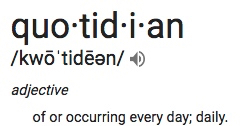Community / Discernment / Spirituality
Stewardship in the Quotidian: The Kingdom in the Bathroom

The ethical dilemma of my Monday morning: what should I do about a nasty toilet seat? My local coffee shop only has one bathroom, one toilet. I noticed the condition of the commode and was presented with this dilemma. Should I clean up a mess that I didn’t make, or should I leave it for someone else? Does my faith in Christ make a difference for the state of this tiny bathroom?
As a pastor, one of my primary responsibilities is offering a vision of a “kingdom-shaped moral imagination” for my congregation. That is, in my teaching and pastoral care, I seek to inculcate in my parishioners a moral imagination shaped by God’s kingdom. Central to this kingdom is the theme of blessing; as Christians, we inherit the promise to Abraham, that “in you all the families of the earth shall be blessed.” (Genesis 12:3) It is easy to find grand, moving pictures of how people have, in the name of Christ, sought to bless the world. It takes more creativity, though, to find illustrations of being “quotidian benedictors,” those who bring blessing in the daily grind. But a moral imagination shaped by a kingdom of blessing, like a good sealant or caulk, will press into every small crack and crevice of life. As Jesus said, “The kingdom of heaven is like leaven that a woman took and hid in three measures of flour, till it was all leavened.” (Matthew 13:33)
A friend of mine once showed me what such “quotidian blessing” looks like in action. We were cleaning out some large orange coolers from a church event and they were gross. Sticky food and drink were covering the inside and the outside. A big sugary mess. Worse still, it was clear that these coolers had been like this for weeks. With any situation like this, entropy can take over: “Why should I clean up someone else’s mess?” “No one will notice.” “I’ll just leave it.” But my friend took a deep breath and said, “stewardship is leaving things in better condition than you found them.” And he dug in and got to work. It is this attitude of stewardship that transforms our moral imaginations, enabling us to encounter the world as a place with endless possibilities for blessing.
How do we become daily blessors? Stewardship in the quotidian. If we’re not careful, talk of transforming society can lose this simple truth, that Christians make the world a better place, even through small actions. This is liberating, especially for those who spend their days answering emails, looking at spreadsheets, counting quarters, changing diapers, or simply trying to make it. But this liberating truth comes with an edge: because Christians make the world a better place, we can expect that our lives will be filled with minor inconveniences, areas of dirt and grime, and hurting and frustrating people.
Consider this truth: God wants to bless the world. The Son of God came to redeem the Church, transforming the people of God and sending them out into the world on his mission of blessing. So, when Christ considers the hurting grocery store check-out clerk, of course the best person to be in her line is a Christian. If you’ve ever wondered why you always find yourself in the slow line with the talkative worker, it’s spiritual warfare—not that Satan is trying to ruin your day, but that God is using you to brighten someone else’s.
Back to the bathroom. It’s not so bad that I need professional cleaning gear (the staff can handle those situations). It’s just an inconvenience. I can look the other way. But, I could also make a difference. I can choose to bless the next person who comes in, even if they never know about it. This is stewardship in the quotidian: leaving things in a better condition than I find them, all in the name of Christ. Such is our priestly calling as Christians, spreading the fragrance of Christ’s redemption throughout the world, even through small acts of grace.
Copyright © 2018 Billy Boyce

